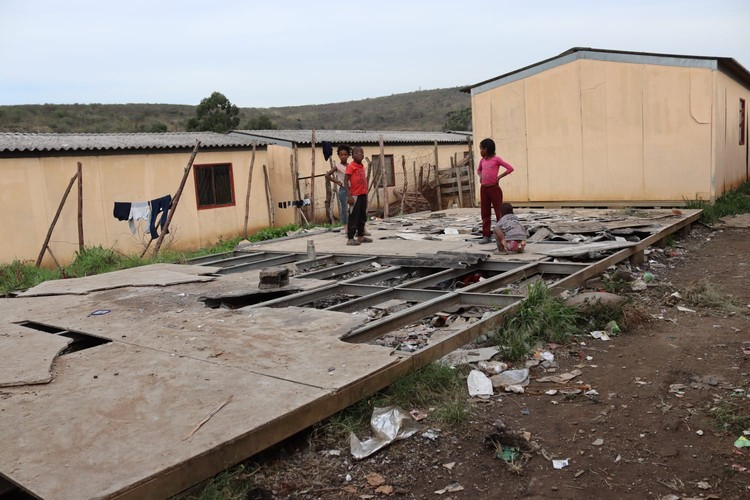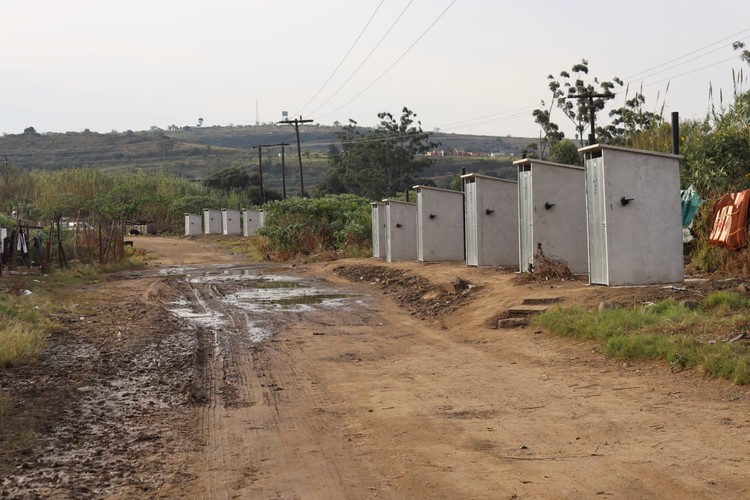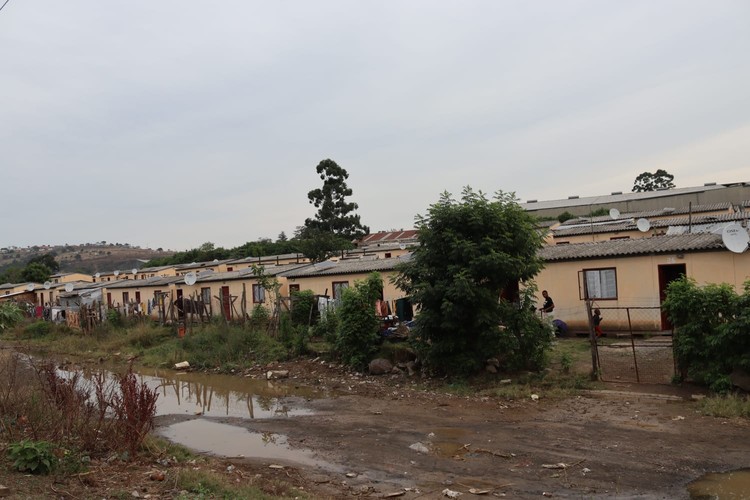Butterworth families evicted by chiefs in 2011 are still waiting for promised houses
People of Bhungeni were moved to make way for a mall which has still not been built
Families from Bhungeni who were moved to temporary housing in 2011 to make way for a mall are still waiting for proper houses. Photos: Manqulo Nyakombi
- About 300 families who were moved from shacks in Bhungeni, Butterworth, in the Eastern Cape in 2011 by the Fingo Tribal Authority are still waiting to be housed.
- They were moved from land belonging to tribal authority to temporary shelters.
- The tribal authority had made an agreement with a developer to build a mall.
- But 13 years later the mall has not been built and the families have not been rehoused.
Families who were evicted from their shacks in Butterworth, Eastern Cape, in 2011 by the Fingo Tribal Authority to make way for a mall are still waiting for their houses.
The 300 families were evicted from Bhungeni informal settlement and moved to temporary housing in nearby Eugene. They say they were told by officials from Mnquma Local Municipality and the Eastern Cape Department of Human of Settlements that they would be moved to RDP houses.
But 13 years later they are still in temporary housing and there is no sign of a mall. The area they live in is wetland. They have no electricity. Some families rely on illegal connections while others use wood fires to cook.
They have pit toilets and they say that for years the toilets were not cleaned. Then this year they threatened not to vote unless the toilets were cleaned. Fifteen more pit toilets were then added and the old ones were cleaned.
Most of the shelters have broken walls, windows and doors. Some residents have used zinc sheets to cover the broken walls.
There are dumping sites just a few kilometres away.
Nothing has changed since GroundUp reported on the community in 2017.
Sisa Matutu, who was the residents’ chairperson when the eviction happened told GroundUp that on the morning of 30 March 2011 they were woken up by bulldozers and some soldiers destroying their shacks.
Matutu had lived in the area since 1979.
He said the residents knew that the land belonged to the chiefs and that the chiefs had applied for a court order. “When the eviction happened, we were still busy consulting lawyers asking for help. Everything happened so fast, people were not even given a chance to take their belongings. Most people lost their things there,” said Matutu.
He said for two days residents were left homeless and they sheltered in an old factory. Then, he said, the Department of Human Settlements built the shelters as an emergency measure. He said the land was not levelled and the shelters were put on top of bricks because it is a wetland. “Those bricks broke down a long time ago,” he said.
Matutu, who is now an ANC PR councillor and head of the strategic management portfolio at Mnquma Local Municipality, no longer lives in Eugene.
Resident Nonzwakazi Botomani said living conditions in Eugene are very bad and crime is very high.
“As you can see the floor in this house is wet. If you go around these shelters you will find small dumping sites, there are no bins. As for water, some residents managed to install a few taps close to their homes otherwise we were only provided four taps for the whole area. The toilets were not cleaned for 13 years. Some of us were relieving ourselves in bushes until recently they cleaned them,” said Botomani.
Botomani fears that the new toilets are a sign that the families are not going to be moved any time soon.
Nonzwakazi Botomani fears that the provision of new toilets means that the Eugene families won’t be moved any time soon.
When GroundUp visited the area we met a group of seven residents who were gathered next to a wood fire drinking wine. When they saw us they quickly hid their drink and asked to be interviewed but only if their names were not used.
They said most people in the area rely on the Expanded Public Works Programme for employment, and feared that if municipal officials found out that they had spoken to the media they would not be hired.
One man told us that if we went around the area we would find more groups of people sitting and sharing two-litre containers of wine.
“This is the situation in this area, we drink because … we don’t want to focus on the bad conditions we live under. My shelter has no windows, the door is broken and I don’t have money to fix them. To be honest I stopped worrying about them a long time ago,” he said.
“Every day when I wake up, I only think about finding a piece of work even if it’s gardening. Once I get paid R50, I buy bread and go to my friends to drink,” he said.
Mnquma Local Municipality spokesperson Loyiso Mpalantshane told GroundUp construction of the mall would start “in the immediate future”. He said the re-zoning, feasibility study and Environmental Impact Assessment were complete and building plans had been submitted to the municipality, Eskom and Amathole District Municipality.
Regarding the promised houses, Mpalantshane said this was the responsibility of the Department of Human Settlements.
Residents say after 13 years the roofs and walls of their temporary houses are broken.
Fingo Tribal Authority chairperson Chief Zizi Ngcongolo said the land belongs to the Fingo tribe, with chiefs from Tsomo, Ngqamakhwe and Butterworth.
He said he was not chairperson when the eviction occurred but he was aware of it.
“Residents were informed even before they built there, that the land belongs to the chiefs not the municipality. When we wanted our land, we informed the municipality and asked them to find a place for the people, but residents refused to leave. We then took the matter to court. We were granted the order to evict the people,” said Ngcongolo.
He said the construction of the mall would bring jobs for Butterworth residents.
“We had delays because we were still looking for investors and we have found them. On Wednesday we will have our last meeting. Then if all goes well, construction will start,” he said.
Siyabonga Mdodi, spokesperson for the Eastern Cape Department of Human Settlements, did not answer GroundUp’s questions in spite of promises to do so.
Support independent journalism
Donate using Payfast

Don't miss out on the latest news
We respect your privacy, and promise we won't spam you.
Next: Unless this government fixes SAPS, it won’t meet its other objectives
Previous: Exhibition honours work of late Bang Bang Club photojournalist
© 2024 GroundUp. This article is licensed under a Creative Commons Attribution-NoDerivatives 4.0 International License.
You may republish this article, so long as you credit the authors and GroundUp, and do not change the text. Please include a link back to the original article.
We put an invisible pixel in the article so that we can count traffic to republishers. All analytics tools are solely on our servers. We do not give our logs to any third party. Logs are deleted after two weeks. We do not use any IP address identifying information except to count regional traffic. We are solely interested in counting hits, not tracking users. If you republish, please do not delete the invisible pixel.



